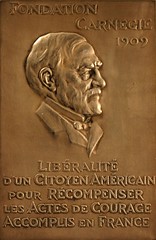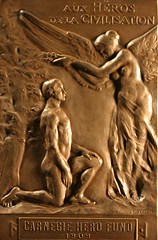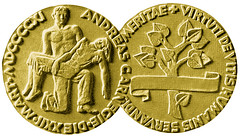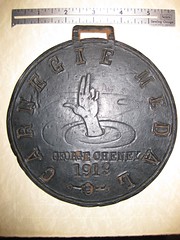
PREV ARTICLE
NEXT ARTICLE
FULL ISSUE
PREV FULL ISSUE
CARNEGIE HERO FUND MEDALS
The December 2010 issue of
imPULSE, a periodic newsletter of the Carnegie Hero Fund Commission pictured examples of the Swiss and French medals, as well as an unusual primitive "Carnegie Medal". Walter F. Rutkowski, Executive Director and Secretary of the Fund, kindly forwarded me copies of the images and text for use here in The E-Sylum. Thanks!
-Editor


FRENCH MEDAL RE-ISSUED
Thaler was cited by the French fund for rescuing a man from drowning in the Seine River in Paris in 1962, when he was visiting as a tourist. The Fondation agreed to the replacement, but the transaction was delayed by circumstances pertaining to its demise: After a century of activity, the foundation, which was established by Andrew Carnegie in 1909, ceased operations, and remaining funds were transferred to the Franco-American Commission for Educational Exchange, Paris. The request for Thaler's duplicate medal was not lost in the process, however, and the medal was sent by the Franco-American Commission to the Hero Fund in Pittsburgh in late October. Thaler, unfortunately, will not see the replacement, as he died two months after making his request. The medal was forwarded to his widow. Fondation Carnegie was one of 10 hero funds established in Western Europe after the initial success of the Pittsburgh-based Commission. Those remaining active are in the United Kingdom, Sweden, Switzerland, Italy, Denmark, Norway, Belgium, and the Netherlands.
"We live in a heroic age,“ Carnegie wrote in establishing the foundation with a grant of $130,000. “Industrialization molds the heroes of peacetime. Hardly a day passes that a courageous deed is not communicated to one or another existing Hero Trust Funds." The foundation recognizes those, who, on Swiss territory, risk their lives in peaceful endeavors to save the lives of their fellows. Awardees receive a certificate, and engraved bronze, silver, and gold medals are also awarded, as are wristwatches and monetary grants. Young heroes receive a voucher for a hot-air balloon ride or a helicopter flight. Since the establishment of the foundation, more than 8,300 people have been recognized, and more than three million Swiss francs in subsidies have been paid to rescuers and their families. The awards are announced annually
GRANDPA CHENEY'S ‘CARNEGIE MEDAL'
Long, a firefighter and paramedic with the Orange County, Calif., Fire Department, provided details of his grandfather's short, albeit colorful, life, but the family knows nothing about the circumstances for which the medal given. Cheney was born in North Adams, Mass., in 1887, and after graduating from Williams College and then the Colorado School of Mines in 1917, he set off for a career in mining in Mexico, Ecuador, Peru, and Chile. He met his wife, a U.S. embassy worker, in Peru, and the couple were married in 1924. In 1932, Cheney, who was a general foreman, and five other workers were killed in a mining blast in Chile. His widow and two daughters, including Elena, Long's mother, relocated to the U.S. Long says the medal has been in his family for years, but “we've never understood if it had any significance.” The Hero Fund could only confirm that the medal was an imitation of the original, which Long says is “the best expression of humanity I have ever come across.” To learn more about the Carnegie Hero Fund Commission, see: www.carnegiehero.org THE BOOK BAZARRE“We All Have Our Hobbies!”Wayne Homren, Editor The Numismatic Bibliomania Society is a non-profit organization promoting numismatic literature. See our web site at coinbooks.org. To submit items for publication in The E-Sylum, write to the Editor at this address: whomren@gmail.com To subscribe go to: https://my.binhost.com/lists/listinfo/esylum All Rights Reserved. NBS Home Page Contact the NBS webmaster 
|
 SWISS MEDAL REDESIGNED
SWISS MEDAL REDESIGNED
